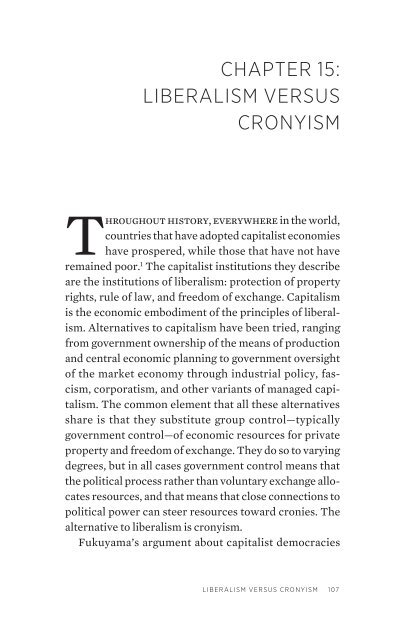url?sa=t&source=web&cd=1&ved=0CCYQFjAA&url=http://mercatus.org/sites/default/files/Holcombe_Cronyism_web
url?sa=t&source=web&cd=1&ved=0CCYQFjAA&url=http://mercatus.org/sites/default/files/Holcombe_Cronyism_web
url?sa=t&source=web&cd=1&ved=0CCYQFjAA&url=http://mercatus.org/sites/default/files/Holcombe_Cronyism_web
You also want an ePaper? Increase the reach of your titles
YUMPU automatically turns print PDFs into web optimized ePapers that Google loves.
CHAPTER 15:<br />
LIBERALISM VERSUS<br />
CRONYISM<br />
Throughout history, everywhere in the world,<br />
countries that have adopted capitalist economies<br />
have prospered, while those that have not have<br />
remained poor. 1 The capitalist institutions they describe<br />
are the institutions of liberalism: protection of property<br />
rights, rule of law, and freedom of exchange. Capitalism<br />
is the economic embodiment of the principles of liberalism.<br />
Alternatives to capitalism have been tried, ranging<br />
from government ownership of the means of production<br />
and central economic planning to government oversight<br />
of the market economy through industrial policy, fascism,<br />
corporatism, and other variants of managed capitalism.<br />
The common element that all these alternatives<br />
share is that they substitute group control—typically<br />
government control—of economic resources for private<br />
property and freedom of exchange. They do so to varying<br />
degrees, but in all cases government control means that<br />
the political process rather than voluntary exchange allocates<br />
resources, and that means that close connections to<br />
political power can steer resources toward cronies. The<br />
alternative to liberalism is cronyism.<br />
Fukuyama’s argument about capitalist democracies<br />
LIBERALISM VERSUS CRONYISM 107


